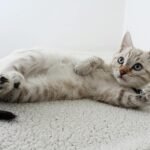That enigmatic purr, those deliberate slow blinks, the way your feline companion seems to orchestrate their entire day around your presence. You’ve likely wondered what goes through your cat’s mind when they choose your lap over any other spot in the house or follow you from room to room like a furry shadow.
The truth is, your cat’s behavior toward you reveals a complex emotional world that scientists and behaviorists are only beginning to decode. Your feline friend doesn’t just tolerate your presence. They actively seek it out for reasons that go far deeper than food or shelter. Let’s explore the fascinating psychology behind why your cat simply .
You’re Their Security Blanket

Your cat views you as their ultimate safe haven, a secure base from which they can confidently explore the world around them. Research conducted at Oregon State University’s Human-Animal Interaction Lab revealed that the majority of cats use their humans as a source of security and comfort, with 65% of cats showing signs of being “securely attached” to their owners during separation and reunion tests. When your cat feels threatened or uncertain, your presence alone can transform their anxiety into calm confidence.
This security attachment explains why your cat might become more active and explorative when you’re home. Cats are more likely to explore and interact with their environment when they feel relaxed and comfortable in a person’s presence, so if your pet is often on the move while you’re with them, it’s actually a subtle sign of affection because they are more comfortable in your presence. Your cat doesn’t just love you; they trust you completely with their vulnerable moments.
They’ve Marked You as Family

When your cat head-butts you and rubs against your body, they’re leaving pheromones on you to let everyone else know that you belong to them. This isn’t just casual affection; it’s a deliberate claim of ownership and family membership. Cats usually bump heads only with members of the same social group to reinforce their bond, using scent glands in their cheeks and head to create a group scent when they headbutt and rub against each other.
The rubbing behavior extends beyond simple marking. When cats rub against you, this behavior is essentially them “claiming” you through scent marking, depositing pheromones and oils from the scent glands located on their forehead, cheeks, and chin. Think of it as your cat’s way of creating a family crest that only they can detect. You’re not just a human in their world; you’re an honorary cat who belongs to their exclusive social circle.
You Remind Them of Their Mother

Cats begin kneading as tiny kittens when they are nursing, and this behavior translates into affection in adult life, with cats being very clear that you make them feel loved and comfortable when they knead you. That rhythmic pushing motion against your legs or lap isn’t random behavior. Kittens knead their mother’s stomach to stimulate milk flow, so when your cat kneads your lap, they probably feel very content, secure and happy, experiencing the same feeling they would have had when they were a kitten with their mother.
This maternal connection runs deeper than mere comfort. Cat behaviorists believe that purring first starts as a form of communication and bonding mechanism between kittens and their mothers, serving as a common indicator of comfort and ease. When your adult cat purrs in your presence, they’re essentially reverting to their most secure emotional state, treating you as the nurturing figure who provides unconditional love and safety.
They Trust You with Their Vulnerability

When your cat rolls over and shows their belly, they feel safe and comfortable with you, as their bellies are extremely vulnerable and are only exposed to those they trust. This display of vulnerability represents one of the highest forms of trust your cat can offer. Cats naturally sleep a lot and choose to do this in quiet spaces, and they make themselves vulnerable when they sleep.
The trust extends to their gaze as well. A cat’s slow blink is often referred to as a “kitty kiss,” and when your cat looks at you and slowly closes and opens its eyes, it’s a sign of trust and affection that indicates your cat feels safe and secure with you. While cats generally find eye contact threatening, if your cat is happy to look you in the eye with a nice soft, relaxed gaze they have accepted you as non-threatening and are very happy in your company.
You’re Part of Their Grooming Ritual

Cats groom each other as a display of affection, and this behavior extends to humans when trust is built, with cats often licking their people, which is similar to the grooming cats perform on their feline friends to mark each other and build their bond. When your cat methodically licks your hair or skin, they’re performing the same intimate grooming ritual they would with their closest feline companions.
Cats lick other cats in their social group partly to bond but also to create a group odor, and this group smell helps both pet cats and feral cats tell who is in their social group, so if your cat licks you, it’s probably because they know they’re a part of your family. This grooming behavior isn’t just affection; it’s an acceptance ceremony. Your cat is actively working to make you smell like family, ensuring that you carry their scent signature as a member of their inner circle.
They Communicate Exclusively with You

Cats don’t typically meow to communicate with other cats; they reserve this behavior for interacting with humans, and if your cat frequently meows at you, especially with a soft, gentle tone, it’s their way of getting your attention and showing affection. Your cat has essentially developed a unique language just for you, complete with different tones, pitches, and patterns that they use exclusively in your relationship.
Cats will often give us short, quiet meows when we speak slowly and softly to them, though if the meows get longer and drawn out or turn to hisses, this may be a sign that your kitty has had enough interaction. This vocal communication represents a sophisticated understanding of human social cues. Your cat has learned to modulate their voice specifically for your ears, creating a personalized dialogue that exists nowhere else in their world.
Conclusion

Your cat’s devotion runs far deeper than simple dependency or routine. They’ve chosen you as their security anchor, family member, and primary source of comfort in a world that can feel overwhelming and unpredictable. Every head bump, purr, and gentle bite represents a conscious decision to include you in their most intimate social behaviors.
The next time your cat follows you to the bathroom or insists on sitting directly on your keyboard while you work, remember that you’re witnessing pure feline love in action. What do you think about these surprising ways your cat shows affection? Tell us in the comments.





